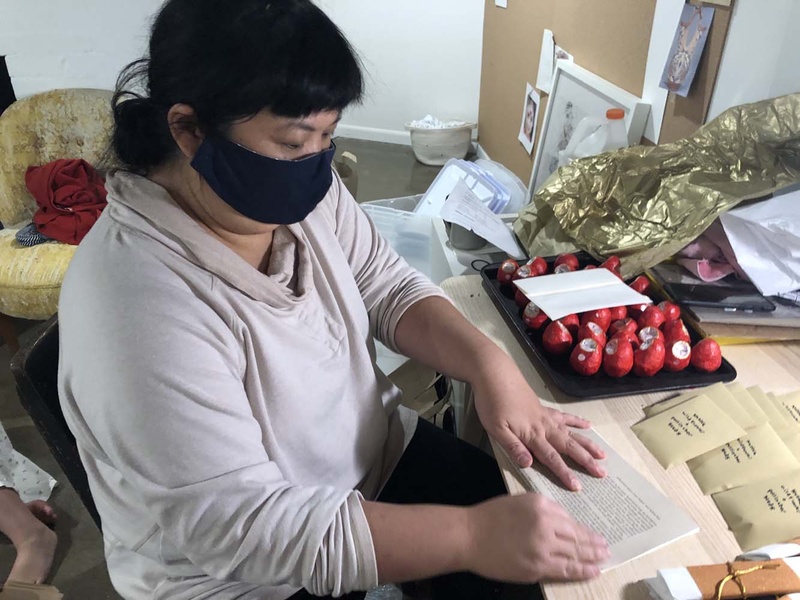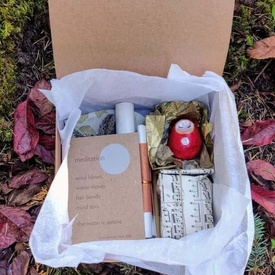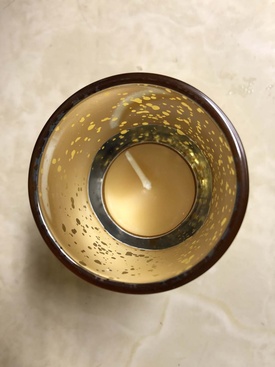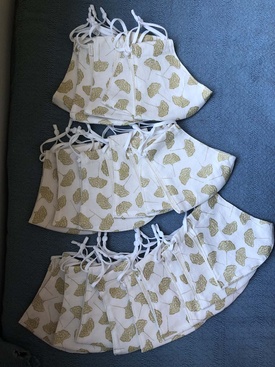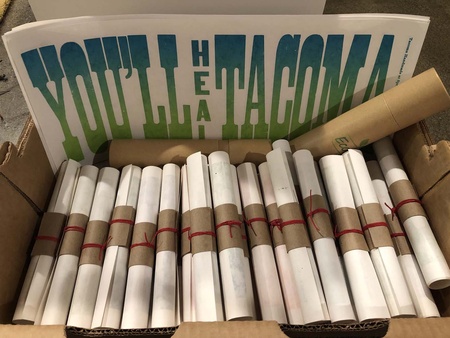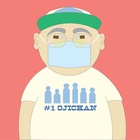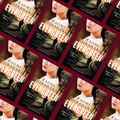In October 2020, Tamiko and Teruko Nimura were asked to create a community engagement public art project for Tacoma Arts Month (a month celebrating arts and artists in Tacoma). They drew on their Japanese American heritage and created a batch of care packages which they distributed all over Tacoma, Tamiko’s hometown. Each care package had a letter describing the purpose and the contents of the package. Below is the letter.
* * * * *
September 25, 2020
Dear neighbor,
It’s a rare sunny afternoon in late September—maybe one of our last for the season. After the wildfire smoke a couple of weeks ago, we’re grateful to be looking out of our windows at clear blue skies.
A few weeks ago Teruko Nimura, an artist, was asked by the City of Tacoma Office of Arts and Cultural Vitality to see if she and her sister Tamiko wanted to create something for Tacoma Arts Month. “This year’s theme for Tacoma Arts Month is ‘Cultivate wonder and care,’ a care package for our community.” Teruko is making care packages of her art to distribute as a public art project. When she talked to Tamiko about Tacoma Arts Month, the two of them thought, “What about a mental health care package?” Tamiko added, “And what if we made them to give to the Food Is Free tables?”
The City provided us with a small budget, and we got to work. We wanted to bring tangible expressions of human care across our city and into spaces that already serve our community. Though we’ve been working separately as artists for many years, this project is our first artistic collaboration as sisters.
The result is what you are holding in your hands.
Reflecting on the project a little later, Teruko wrote:
I think right now I am really afraid for our ability to relate to one another and recognize our shared humanity. We were already on the brink of barely existing in real time and space with one another because of our preoccupation with our phones. Now because of masks, 50% of our facial expressions are hidden. The Tacoma Arts Month theme “Cultivate wonder and care” feels like an urgent call to action. We are all so isolated right now. I just wanted people to know that they are loved fundamentally as a fellow human being, and to remind them to slow down and practice some self care. For me that’s what our project is about.;
Tamiko is writing this letter. Words are one of the main ways that she connects with the world, as a lifelong reader and writer. As a visual artist, Teruko believes in the power of handmade objects to connect people, whether it’s artist to audience or giver to receiver. Handmade objects, by definition, carry the touch of the maker. In these hard times when touch is so complicated, we want you to know that this package is from our hands to yours. (Both of us live in symptom-free homes, and we have been taking precautions to protect everyone’s health, in case that is a concern.) Both of us also work on art and history projects that involve our Japanese American heritage. Roots: that’s where we find comfort and sustenance and nourishment.
Wherever possible, we found local sources for the items in this package, and eco-friendly ones. Teruko made the handmade daruma statues at her home studio. Tamiko’s daughters went to Springtide Press studio in North Tacoma and helped us made the letterpress postcards. Jessica Spring is a letterpress artist and generously donated her time, space, equipment, materials, and energy to help us design and make the postcards. Wendy Hamai read about our project in the newspaper and e-mailed Tamiko with an offer to make masks. (Wendy made the ginkgo pattern masks.) Dana Coggon, a noxious weed control coordinator— packaged wildflower and pollinator seeds for us. Tamiko’s neighbor donated lavender from her yard. A donor who wishes to remain anonymous gave us nigella seeds. Tamiko’s husband helped her wrap the beeswax candles and glass votives with some of his old sheet music. We tried to make as many of these things as we could, and wrap them with care. This is a gift from within our community, to our community.
Wherever or whoever you are in the city, we hope that the care package brings you some form of comfort and encouragement. If you are on Facebook in the Food is Free Project Tacoma group, feel free to take pictures of your care package and post them in the group, tagging us and #careisfree. If you feel inclined to give something in return—but not at all required!—please bring contributions to your nearest Food Is Free table (map and more available at https://www.foodisfree253.com), the table where you received this package, or give directly to the Food Is Free Project. Or, just pay some of this forward.
In Tacoma, as the writer Renee Simms says, we rise together.
Tamiko Nimura and Teruko Nimura
* * * * *
What’s In The Box?
We’re putting together these care packages for people across Tacoma, giving 5 packages each to 7 different Food is Free tables. Here’s a little more information about what we are including in each package.
Daruma statue
Teruko made and designed these statues of the Daruma figure in her home studio. The process took close to six weeks. The Daruma figure is supposed to be a Buddhist monk seated in meditation, and it’s usually weighted at the bottom, so it’s impossible to tip over. The Daruma has come to represent resilience, the ability to spring back no matter what. Both of us have daruma statues in our houses. Normally the statue’s eyes are blank; the recipient of the statue fills in the pupil of one eye with black ink when they set a goal for themselves, and fills in the other eye when the goal’s been achieved. Japanese and Japanese Americans give daruma statues to each other as a symbol of persistence and encouragement. These daruma statues have their eyes closed, to represent rest and movement inward—they go with the “meditation” poem on the postcard.
Candle and glass votive
Lighting a candle can mean many things across cultures, religious, countries. In Copenhagen, where Tamiko’s husband has travelled, there are few street lights at night—everyone puts candles outside instead. Light can mean something as simple as hope, as complex as resolve. We hope that lighting a candle for you will give you a moment of reflection, especially as we enter the darker months of the Pacific Northwest.
Seeds
We have both found that growing things in our gardens has given us a powerful sense of momentum, connection to the earth, and looking towards the future. This year Tamiko grew vegetables (tomatoes, potatoes, garlic, and green beans) in her backyard, and flowers (calendula, chamomile and hummingbird mint) in her front yard. Teruko grew lettuces and kale in containers on her sunny wooden deck. There are two kinds included: 1) The black seeds that look like sesame seeds are called nigella, or “love in a mist.” You can scatter them in the spring. These were donated to us by a gardener in Federal Way. 2) The seed packets are for native pollinator plants, donated to us by Food Is Free Tacoma table host Dana Coggon, who is a noxious weed control coordinator. Dana has also mixed the native pollinator seeds with seeds from her yard. Tamiko has planted a patch of these in her front yard and watched the plants grow from tiny green circles to lacy green leaves. We hope you’ll plant your sets of seeds in the spring, as a reminder that nature continues to move us forward.
Handmade mask
For us, these handmade fabric masks represent comfort and community care. In the age of COVID-19, wearing masks are a form of protection and an act of care for vulnerable members in our community. We made the masks together, Teruko choosing the fabric and design, Tamiko cutting out the outlines, and Teruko sewing them together. You have one of two patterns on your mask: 1) The clamshell pattern on the outer fabric is a Japanese pattern called seigaiha and is supposed to represent the waves on the open sea. It’s one of Tamiko’s favorite patterns. Teruko made these masks. 2) The ginkgo leaf pattern has special meaning for us too. Teruko just found an amazing story about ginkgo trees in Hiroshima, Japan, that survived the atomic blast there. Our grandparents immigrated from Hiroshima, and several of our relatives are survivors of the atomic bomb. We take hope in our family members and the gingko trees, which have roots that enable the trees to survive in stressful conditions. We’re grateful to Wendy Hamai, who volunteered to make these for us.
Chocolate
Both of us love chocolate, and have included some here because it makes us happy. Dark chocolate is also known as a “superfood” with antioxidants. Theo Chocolate is a Seattle-based company.
Lavender
Lavender is one of Teruko’s favorite scents. It’s often used to combat stress, anxiety, and insomnia, and sometimes even depression. Our lavender bundles were grown in Tacoma and donated generously by one of Tamiko’s neighbors.
Poster
Modeled after the “You’ll Like Tacoma” sign, “You’ll Heal Tacoma” is also part of the package. Jessica Spring designed and printed these posters at Springtide Press. Tamiko likes the double meaning of “You’ll Heal Tacoma” (as in, “you will feel better soon,” and “you will go forth and heal the city”). Jessica has distributed these posters around Tacoma for Tacoma Arts Month, and invited people to take a poster and write how they will heal in exchange. She asked us to include these posters in our packages.
Postcard, stamps, pens
We are all struggling to maintain relationships with others these days, so we wanted to make it a little easier for you to connect with others in your life.
Meditation is another way that both of us have found a few peaceful moments during hard times. Tamiko has also found that writing helps her to process difficult times and make new discoveries just by the act of writing by hand. The poem “Meditation” on the postcard is by our uncle, Japanese American poet Hiroshi Kashiwagi, from his collection Ocean Beach. He passed away at the age of 96 last year, and we miss him very much.
Teruko, Tamiko, and her daughters designed and printed these letterpress postcards in collaboration with Jessica Spring. In Jessica’s beautiful spacious studio, we chose a typeface, paper, and ink colors, and then learned how to typeset each letter and image on the card. It was the first time Tamiko and Teruko had ever done letterpress printing and we hope that some of that excitement carries over into the postcards you’re holding. We loved learning how to typeset, add spaces, feed cards into the press, and crank the motor by hand, placing each one onto a drying rack. The whole process of designing and printing the cards took about 12 hours (not including drying time between each pass). Jessica generously donated time, space, equipment, and materials for the postcards, and we’re very grateful.
We hope you enjoy your care package!
© 2020 Tamiko Nimura


